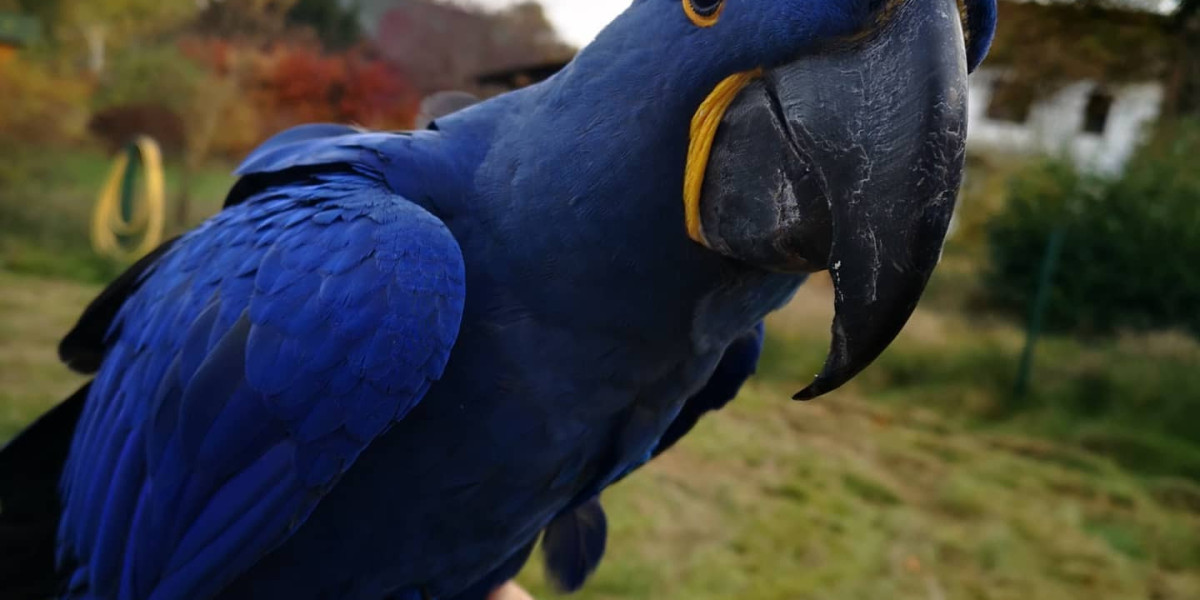Hahn's Macaws are social, and sociable birds that thrive off human interaction. If left alone, they could become bored and destructive. They might chew on toys, or even attack humans and animals.
 These medium sized birds are the smallest members of the macaw species and they are extremely intelligent. They are quick to respond to training and are great speakers.
These medium sized birds are the smallest members of the macaw species and they are extremely intelligent. They are quick to respond to training and are great speakers.Characteristics
It is easy to train and playful. the Darling hahns macaw is an excellent option for anyone who wishes to enjoy the pleasures of a macaw, but does not have the room or funds to purchase a larger species like one with a blue, scarlet and gold, or a green-winged macaw. The miniature macaws are pleasant and intelligent personality. They require attention and socialized every day as all birds do. Young macaws can nip, but they get over this behavior as they grow older and become more social.
The Darling hahns Macaw, like all parrots needs to be capable of playing and exercising their muscles every day. They also like learning new tasks, which keeps them mentally engaged and keeps them from becoming bored. It is recommended that this bird be taught by an experienced trainer who is familiar with macaws and their behavior.
The Darling Hahns Macaw is primarily found in the tropical forests and savannahs as well as swamps in eastern Venezuela and northeastern Brazil. Their green color hides them among the foliage of their habitat. They live in the holes of palms (Carya spp.) but have been known to use holes from other types as well. The birds lay between two and five eggs which hatch after 24 days. After about two months, the chicks are weaned.
Like most macaws, the Darling hahns are great talkers in the early age. They can learn words, tunes and whistles. They are particularly adept at imitating high-pitched human speech. They also have a unique sound that resembles caricature laughter.
Like all parrots as well, the Darling hahns need food that is high-quality seeds, fruits, nuts and other vegetables. These birds prefer the black-sage bush's berries Cordia aubletis as well as the paste tree flowers (Carya spp.). They will eat almost anything that is given to them and are particularly in love with avocado as well as apricots and mango. Like other parrots, Darling can be susceptible to diarrhea. If the symptoms persist, consult your veterinarian.
Care
Macaws are avid learners and are easy to train. They are extremely vocal and have the ability to develop a huge vocabulary from an early age. They can also imitate human sounds and even laugh in a funny manner. They love to play and should be provided with plenty of toys both inside their cage and out. It is recommended to rotate the toys regularly to ensure that your bird is not bored. These birds love to bathe and so a bowl filled with water must be provided on a regular basis.
They need to be physically and mentally active. This can be accomplished by allowing them to fly in an open aviary, or by taking them on regular play sessions. They can also be taught to climb and use claws to unlock doors or latches to escape.
They are social animals and make great pets for families. If they are properly trained and tamed, they will be gentle with the children in the household. Young macaws are more likely bite, but they tend to calm as they mature. They are strong enough to cause serious harm, which is why it's vital to stop any bad behavior as soon as it is possible.
During their adolescence these birds may become aggressive and territorial as they begin to develop their own feathers. It's similar to teens getting angry with their parents and attempting to drive them away. This is a normal part of their development and can be very frustrating for new owners. As they grow older this behavior will lessen and they will form strong bonds with their owners once again.
It is essential to buy a macaw that is well-bred from an established breeder. These birds are rarely found in traditional pet stores. They should be purchased from a breeder that can provide references as well as information about the condition of the cages and parent stock. This will ensure that your bird will live a long and happy life. Breeders should be able to answer any questions that you have about caring for a bird.
Feeding
Macaws from Hahn's require plenty of attention and interaction. They are highly intelligent birds who enjoy playing, talking and learn. They need to be able to communicate their passion or else they'll end up being destructive. This is why having an human companion is essential.
In the wild, they are trained by nature to eat leaves of trees. A home owner should feed them with meals which are high in protein and nutrients. They should be fed a mix of fruits, vegetables and pellets. Table scraps are fine for them, so long as they are healthy and do not contain sugar or fat. Some of the food items that are suitable for giving include spinach, broccoli as well as kale, carrots chili peppers, squash and apples. They are natural omnivores and can be fed many different grains, seeds, and nuts as well.
These macaws are also very active and will need a lot of room to fly and climb. To keep them occupied, and to keep them interested give them various toys within and outside their enclosure. They should also be permitted to leave their cage for a minimum of two hours per day, though three or four hours is the ideal. They are susceptible to self-mutilation and respiratory infections if they do not exercise enough.
A Darling Hahns Macaw needs to have a clean and tidy environment. The cage must be cleaned daily and all feces and other waste needs to be eliminated. The cage should also be kept clear of drafts and heat sources. It is a good idea to keep the cage in an area that is at least 65° Fahrenheit.
Darling hahns Macaws are vocal like other parrots. This is particularly the case at dusk and dawn. They'll squawk for brief durations and will call out to their flock. The squawking will intensify if the bird is feeling unsatisfied with his environment or isn't getting enough attention.
When a pet macaw has behavioral issues, it's usually because something is missing in their lives. They aren't satisfied if they don't have a partner, don't get enough exercise or social interaction, and don't have the proper diet. These problems can often be corrected by taking time to establish trust with the macaw as well as creating an enjoyable environment.
Training
These birds are highly intelligent, and they can be trained easily. They are also playful and affectionate. But, like all macaws, they have a difficult adjustment to a change of environment and require a lot of interaction with their owners. If they aren't given enough attention, they could start to display behavior issues that are difficult to correct.
The cage should be spacious and allow them to move freely. They will do best when they are kept in pairs, as this is their natural behaviour. To avoid boredom the cage should be filled with toys that are rotated to keep them mentally and physically stimulated. These birds are awestruck by the ability to talk and mimic, and are able to be taught a wide variety of phrases and words. It is also said that they have a longer, more flexible tongue than other birds. This could help them to better understand human sounds.
It is essential to begin training your macaw at an early age when they are young and eager to learn new techniques. It is crucial to employ positive reinforcement to encourage good behavior and discourage bad behaviors during training sessions. Macaws have a strong sense of self-preservation and may become scared if they do not feel secure and safe. It is essential to understand the body language of your macaw and how it communicates with you so that you can spot signals of aggression or fear and stop bad behavior in the bud before it turns into major behavior problems.
If you're a new pet owner it is essential to begin as soon as possible a relationship with an avian veterinarian. Regularly checking your macaw can aid in preventing serious illnesses and illnesses that could turn fatal. Annual exams should include a fecal analysis and blood work. Psittacosis vaccines, Avian Bornaviruses and Polyomaviruses are also recommended.
Your macaw should play and interact with you for 2 hours every day in order to be a happy, healthy pet. This is a lot of time for most households which is why if you do not have the time to provide your pet with the attention it requires, it is likely to be better off finding a new place to keep it. Providing your macaw with regular, daily interactions will improve the bond between you and your pet. This will eventually result in an improved, healthier and happier bird.








